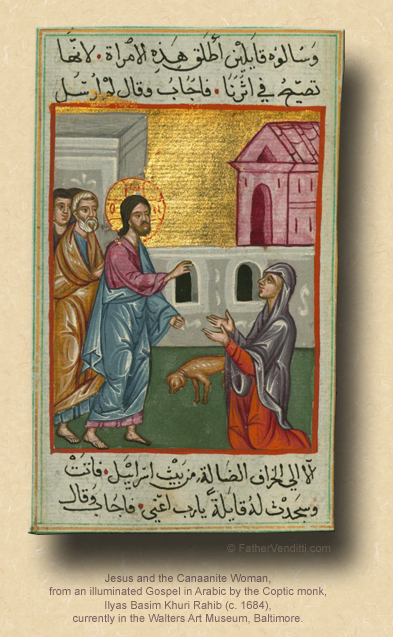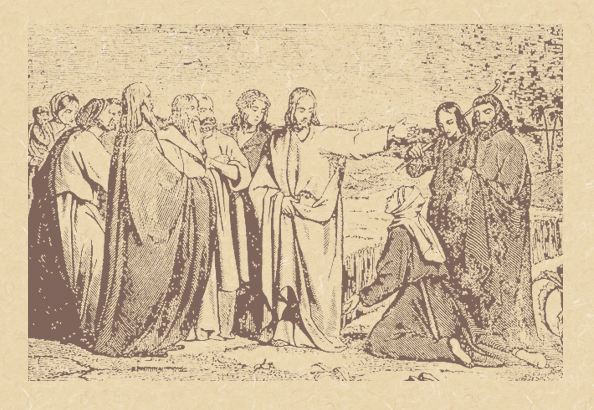How Deep Is the Mine of God's Wisdom.
The Fifth Thursday of Ordinary Time; the memorial of Saint Jerome Emiliani; or, the Memorial of Saint Josephine Bakhita, Virgin.*
Lessons from the secondary feria, according to the ordinary form of the Roman Rite:
• I Kings 11: 4-13.
• Psalm 106: 3-4, 35-37, 40.
• Mark 7: 24-30.
|
If a Mass for St. Jerome is taken, lessons from the feria as above, or from the proper:
• Tobit 12: 6-13.
• Psalm 34: 2-11.
• Mark 10: 17-30.
[or, Mark 10: 17-27.]
…or, any lessons from the common of Holy Men and Women for Educators.
|
|
If Mass for St. Joesphine is taken, lessons from the feria as above, or from the proper:
• I Corinthians 7: 25-35.
• Psalm 45: 11-12, 14-17.
• Matthew 25: 1-13.
…or, any lessons from the common of Virgins for One Virgin.
|
The Third Class Feast of Saint John of Matha, Confessor.**
Lessons from the common "Os justi…" of a Confessor not a Bishop, according to the extraordinary form of the Roman Rite:
• Ecclesiasticus 31: 8-11.
• [Gradual] Psalm 91: 13-14, 3.
• [Tract] Psalm 111: 1-3.
• Luke 12: 35-40.
FatherVenditti.com
|
 8:49 AM 2/8/2018 — Those of a purely elementary faith—those unpracticed in the movements of the soul through the interior life—would be very confused with today's Gospel lesson; for, in it, our Blessed Lord is approached by a woman who is drawn to him solely by faith, seeking nothing for herself, but begging him to help her tormented daughter. She's persistent, so much so that, in Matthew's account of this encounter, the disciples ask him to “Rid us of her..., she is following us with her cries” (Matt. 15: 23 Knox). He turns to her and says, “Let the children have their fill first; it is not right to take the children’s bread and throw it to the dogs.” (Mark 7: 27 Knox); in other words, I'm not going to help you; you're not even a Jew. And I'm sure you're waiting with baited breath for me to explain to you how our Lord isn't really saying what he seems to be saying, and how this is all the result of some inferior translation, which is something that I often like to do. 8:49 AM 2/8/2018 — Those of a purely elementary faith—those unpracticed in the movements of the soul through the interior life—would be very confused with today's Gospel lesson; for, in it, our Blessed Lord is approached by a woman who is drawn to him solely by faith, seeking nothing for herself, but begging him to help her tormented daughter. She's persistent, so much so that, in Matthew's account of this encounter, the disciples ask him to “Rid us of her..., she is following us with her cries” (Matt. 15: 23 Knox). He turns to her and says, “Let the children have their fill first; it is not right to take the children’s bread and throw it to the dogs.” (Mark 7: 27 Knox); in other words, I'm not going to help you; you're not even a Jew. And I'm sure you're waiting with baited breath for me to explain to you how our Lord isn't really saying what he seems to be saying, and how this is all the result of some inferior translation, which is something that I often like to do.
But I'm not going to do that, because there's nothing wrong with this translation. He appears to be rude to this poor woman because he is. He seems to be telling her that, because she's not of the same nationality as he, he's not interested in her problem because that, in fact, is what he's telling her. There is no mistake. He even goes so far as the get personally abusive, telling her, “It is not right to take the children’s bread and throw it to the dogs.”
Of course, there is a method in our Lord's madness which has deep implications for our interior life. Consider first how this poor woman reacts to this very brazen insult: "Yes, Lord, yet even the dogs eat the crumbs that fall from their masters' table" (v. 28 RSV). Now, I don't think there's a woman here who, if they went to a man for help, and he responded by calling her a dog, wouldn't just haul off and slap him silly; but, remember, this woman is desperate. Saint Anselm tells us, in one of his homilies (cf. Golden Chain, MT-MK 4521), that it's clear from the text that this woman clearly believed that Jesus was God, something that most of the Jews with our Lord that day probably didn't yet realize. Keep in mind, too, that she's a Syrophenician. The Syrophenicians were a race of people who had been Jews, but had abandoned the faith and fallen into apostasy, so the Jews threw them out of Israel so as not to be corrupted by them. She's sneaked back across the border for the sole purpose of asking our Lord to help her tormented daughter; she doesn't even want anything for herself. And I think it's safe to assume that there's more than one person here today who will testify that desperation has a way of tearing down the walls of pride. She's come there with a mission, and she's not about to let anything derail her from it, even if it means she has to swallow her pride and take an insult without responding to it.
And here is where we are able to deduce the method in our Lord's madness. He's not so much testing her;—as Saint Anselm told us, she already believes he's God, and he knows this, so he doesn't need to test her faith—but, she does need to be instructed as to why she's doing what she's doing. She's gone there because—as we've said three times now—she's desperate. Her daughter is suffering, she knows that Jesus is in a particular place at a particular time, so she's off. She's not even thinking clearly. By treating her the way he does initially, our Lord forces her to put the breaks on and think about what she's doing, not because there's anything wrong with what she's doing, but because he wants her to understand her own actions: Propter hunc sermonem vade: exiit dæmonium a filia tua—“In reward for this word of thine, back home with thee; the devil has left thy daughter.” (v. 29 Knox). She had no idea that she was acting out of faith, but now she does, and so do the disciples who had initially begged him to send her away.
There is not a person here who hasn't suffered a tragedy or endured a hardship or borne a cross that hasn't caused us to wonder what on earth God is up to. Like the Syrophenician woman, we are already people of faith, and so we ask, “Why is this happening? What have I done wrong?” The answer is that we've done nothing wrong; but, if God were to reveal to us the reason for our suffering, or show us his plan for us or the souls of others that will be converted and saved by our trials and acts of reparation, then there would be no merit in the sacrifice. When one sets out to serve the Lord, one doesn't do what one wants; one does what one is told. Saint Paul said it better:
How deep is the mine of God’s wisdom, of his knowledge; how inscrutable are his judgements, how undiscoverable his ways! Who has ever understood the Lord’s thoughts, or been his counsellor? (Rom. 11: 33-34 Knox).

* Jerome Emiliani (1481-1537) was born in Venice and, after a dissolute youth, he dedicated himself to the service of the poor, the sick, and abandoned children, especially orphans. He died of the plague while serving the afflicted.
Josephine (1868-1947) was a young Sudanese girl sold into slavery and brought to Italy where, while serving as a nanny, she was sent to live with the Canossian Sisters of the Instutute of the Catechumens in Venice. There she was baptized and eventually granted her freedom. In 1896 she joined the Canossian Daughters of Charity where she served for twenty-five years. She died after a long and painful illness, during which she would cry out to the Lord: "Please loosen the chains … they are so heavy!" Her dying words were, "Our Lady! Our Lady!"
** With St. Felix of Valois, St. John founded the Order of the Trinitarians for the ransoming of captives who had fallen into the hands of the Mohammedans. He died in 1213.
|

